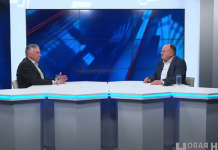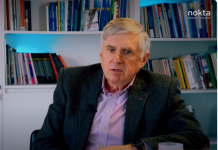Infotag: Mr. Telicka, it is a well known fact that any issue or problem which needs to be resolved has a price. In your opinion, what is the price of Moldova’s integration into the EU and who should pay it?
Pavel Telicka: It is a provocative question. We cannot say what the price of the negotiations for the EU is. My understanding is that Moldova wants to live in a different country. It wants to implement democracy, supported by a strong rule of law, it wants to have institutions which would not be corrupted, judiciary that would act quickly, businesses that could develop themselves and investors that would come to invest. I understand that Moldova wants all that to happen anyway. It wants this change and this has nothing to do with EU.
Of course, all these transformations would be costly. For some people this cost will be their lost jobs, but the costs will be followed by benefits. The state will benefit from the presence of new companies that will invest in Moldova and pay taxes. People will benefit from new job and business opportunities. The country as a whole will profit from its new status and this will be a good opportunity for investors.
Infotag: When do you think Moldova will join the EU? After 5, 10, or 20 years? How could we speed up this process?
Pavel Telicka: The question I have to ask here is: "But does Moldova really want to join the EU?" This is the basic question. I will believe that Moldova wants to join the EU when it will not only say this but also take actions, when it will have a sound strategy supported by concrete reforms. So, it depends primarily on you.
We cannot tell Moldovans now that if you perform you will be for sure a member of the EU because no one can promise that today. The EU has its own objectives and enlargement is not its main goal now. But when the EU will be ready for new enlargement it will not accept new members states that do not make enough efforts. I do not know if Moldova is ready to change enough in 5, 10 or 15 years. You must tell me that!
However, I have a positive feeling following this visit. I have been encouraged by all the meetings I had here, but we still want to see real changes.
It is fantastic what your new government has done because it is a different country already. I think that you deserve a chance to be in the EU in maybe 7-10 years. I would say that 80% it depends on you and 20% it depends on the EU being ready for enlargement. I can tell you for sure that in the future EU would not say "no" to a country which would be ready for accession.
Infotag: When could Moldova benefit from a visa-free regime with the EU?
Pavel Telicka: Again, this issue depends mainly on the progress achieved by your country. Hopefully one day Moldova would be a member of the EU and the same people that complain about visas today would say: "I do not want illegal immigration in my country. I do not want parasites in my social system. I am ready to accept emigrants, but only the legal ones. I want to be safe. I want security". That is what the EU wants today. So, you have to fight illegal immigration, drug trafficking, make sure that your legal system functions well, that your borders are secure and then you will travel without visas.
Infotag: To what economic and financial aspects should Moldova pay specific attention during its negotiations on accession to EU?
Pavel Telicka: Moldova should firmly decide on whether it wants to have an open and modern economy, attract as many investments as possible and have a competitive environment even if some Moldovan enterprises will face some initial difficulties. If the answer is "yes", then you will be quicker approaching a free trade regime with EU.
Or you might say "no", we want to protect our industries, our local producers. But some companies may not deserve being protected because they are absolutely not competitive, they are not important or they are mainly inexistent. Therefore, it makes no sense to artificially save them.
The worst thing you could do is to set everything as a priority and try to protect everything. But that is nonsense. EU will not believe it, the negotiations will be very slow and you will not achieve your goals.
Infotag: What mistakes committed by countries which have already accessed to the EU should Moldova try to avoid?
Pavel Telicka: A lot of mistakes. For example, the Czech Republic was very fast in the international reforms at the early stages but later it froze somewhere. We were also very slow in banking privatization. I want to say that sometimes it is painful to have reforms, but if you are too slow, then the implications are even more severe because it is much more difficult to implement them later.
Infotag: Does Moldova’s European integration depend on other regional states, for instance Ukraine, or only on us?
Pavel Telicka: It is difficult to say. At the moment we are not talking yet about Moldova’s integration into the EU. But today you will be expected to move with more or less the same speed as your neighbors. Yet, if you have a better case, then you would move faster because EU would use you as an example to put pressure on your neighbors. So do not wait.
We will know whether EU is ready to accept one member state or a group of three states, for example, when the time of integration comes. But if Moldova would be a too good case and a too different one, I think you would be allowed in. Look at the former Yugoslavian states. Slovenia was a specific case, but all the other parts of Yugoslavia were involved, in a way or another, in an armed conflict. Yet, today Croatia is advancing in the negotiation process and it will not be waiting for Serbia.
(Read the full text of the interview with Mr. Pavel Telicka in the January-February issue of the Profit magazine).







